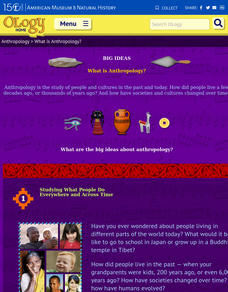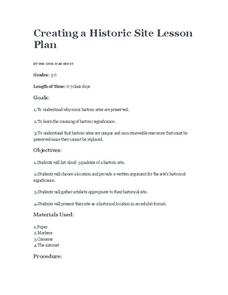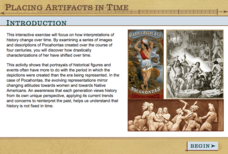Smithsonian Institution
Ceramica de los Ancestros
Scholars join a field expedition team to unearth a plethora of treasures from Central America. Artifacts listed in alphabetical order come with an informational blurb and a picture designed for participants to color. Activity pages...
American Museum of Natural History
What is Anthropology
A colorful resource introduces learners to the four major fields of anthropology: cultural anthropology, linguistic anthropology, biological anthropology, and archaeology. Explanations are provided for what each field studies, the kinds...
Civil War Trust
Creating a Historic Site
A historic site marks a place where a relevant historical event occurred, no matter how many people know about it. Small groups choose their own historical sites, including a place where a class member was born, or even a...
Smithsonian Institution
War of 1812
Luckily for those who aren't history buffs, anyone can guess that the War of 1812 happened in ... 1812. But how to cover the rest of the story? The resource does just that with effective direct instruction that includes statistics,...
American Museum of Natural History
Being a Zoologist: Sandra Olsen
Are your students wild about horses? Then introduce them Sandra Olsen, a zooarchaeologist, who has been studying horses and the people who herd them. Ms Olsen responds to 15 interview questions and details how she goes about her...
Curated OER
Daily Life in Spanish St. Augustine 1565-1763
How do we know so much about the past? A student-crafted presentation provides viewers with images of artifacts from St. Augustine, Florida that give historians and archaeologists clues into lives already lived.
Smithsonian Institution
Western Indian Wars
Why do many Native Americans live on reservations? An interactive resource teaches about how reservations came to be and the tragic history behind Native Americans moving from their lands. Teenagers read passages, view images, and click...
Smithsonian Institution
Civil War
Did you know that more than three million people fought in the Civil War? Through artifacts, graphics, and passages class members learn about the stark divide between North and South that led to the war, as well as about the events...
Smithsonian Institution
New American Roles
America has dealt with its fair share of hardships in contemporary history. The resource discusses the events of the Gulf War, September 11th, the Afghanistan War, and The Iraq War. Scholars click on artifacts to learn more information,...
British Museum
The Kingdom of Benin
Discover the society of Benin through analysis of several artifacts and rich primary source materials. Here you'll find worksheets on topics as the work of Benin craftsmen, the influence of the all-powerful Oba, explanations for the...
PBS
1000 Words
A picture really can speak a thousand words—no matter how old! Scholars become history detectives as they learn how to analyze historical photos and evidence to uncover the past. The fun hands-on activity makes history come alive through...
Smithsonian Institution
Vietnam
What do Dwight D. Eisenhower, Lyndon B. Johnson, and communism have in common? They all have something to do with the Vietnam War. Scholars engage in readings, view related images, and read about important artifacts on the website.
Smithsonian Institution
Cold War
The Cold War was not necessarily always cold in temperature, but the relationship between the United States and the Soviet Union sure was frigid! Scholars read various passages, view exhibition graphics, and observe an artifact from the...
Smithsonian Institution
Korean War
North and South Korea: two regions divided. The story of the Korean War describes the events that occurred when these two regions' ideologies clashed. The resource uses various images and descriptions of artifacts, in addition to...
Smithsonian Institution
World War II
December 7th is remembered as a tragic time in American history, but some scholars may not know why. The resource explains the significance of the bombing of Pearl Harbor as well as how World War II relates to American history. The...
Smithsonian Institution
World War I
How did World War I effect the United States' status as a world power? Pupils examine a website to learn many interesting facts about American involvement during World War I. They read passages and interact with artifacts in an online...
Annenberg Foundation
Placing Artifacts in Time
Can history distort the true story behind famous people? Scholars analyze the many faces of the Native American Pocahontas. Incorporating technology and historical thinking skills, they uncover the many different sides to the Pocahontas...
Smithsonian Institution
Mexican War
Did you know that without the Mexican War, the United States would not include the states of Arizona, California, New Mexico, Texas, Nevada, Utah, and even parts of Colorado? Scholars learn a variety of interesting facts about the...
BrainPOP
Famous Historical Figures Lesson Plan: Who Am I?
History detectives select a famous person to research, fill a bag with items associated with their subject, then ask class members to guess the historical figure represented by the artifacts.
National History Day
Helping Life and Aiding Death: Science, Technology, and Engineering at Work during World War I
Science, engineering, and United States history? Pupils research collections of artifacts from the Smithsonian to learn about historical scientific innovations. At the end of the lesson, they write an essay to discuss technology's...
Echoes & Reflections
The "Final Solution"
Nazi policies shifted from deportation and imprisonment to extermination of the Jewish people in death camps in the "Final Solution." Learners examine photos of artifacts, read poetry written by survivors, analyze testimony from...
Curated OER
Ancient Babylon
Authenticate an ancient civilizations study by having historians analyze primary source artifacts. After examining an image of a Babylonian king votive statue, pupils read a short background context. They then answer 3 questions based on...
Wordpress
Paper Doll Project
Explore self and social construction with a hands-on art project. After studying and discussing bullying and other social experiences, individuals create three paper dolls that represent specific social constructions. Included here is a...
American Museum of Natural History
Making a Field Journal
Trowels and brushes are certainly important tools for an archaeologist working on a dig. Perhaps more important, however, is the archaeologist's field journal. Christina Elson, an archaeologist working with the American Museum of Natural...























